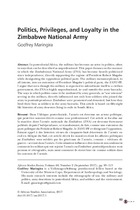| dc.contributor.author | Maringira, Godfrey | |
| dc.date.accessioned | 2022-01-11T10:01:33Z | |
| dc.date.available | 2022-01-11T10:01:33Z | |
| dc.date.issued | 2017 | |
| dc.identifier.citation | Maringira, G. (2017). Politics, privileges, and loyalty in the Zimbabwe national army. African studies review, 60 (2), 93-113. 10.1017/asr.2017.1 | en_US |
| dc.identifier.issn | 1555-2462 | |
| dc.identifier.uri | 10.1017/asr.2017.1 | |
| dc.identifier.uri | http://hdl.handle.net/10566/7076 | |
| dc.description.abstract | In postcolonial Africa, the military has become an actor in politics, often
in ways that can be described as unprofessional. This paper focuses on the manner
in which the Zimbabwean National Army (ZNA) has become heavily politicized
since independence, directly supporting the regime of President Robert Mugabe
while denigrating the opposition political party. The military metamorphosed, to
all intents, into an extension of President Mugabe’s political party, the ZANU-PF.
I argue that even though the military is expected to subordinate itself to a civilian
government, the ZNA is highly unprofessional, in- and outside the army barracks.
The ways in which politics came to be mediated by army generals, as “war veterans”
serving in the military, directly influenced not only how soldiers who joined the
army in postindependence Zimbabwe were promoted and demoted, but how they
lived their lives as soldiers in the army barracks. This article is based on fifty-eight
life histories of army deserters living in exile in South Africa. | en_US |
| dc.language.iso | en | en_US |
| dc.publisher | African Studies Association | en_US |
| dc.subject | Army deserters | en_US |
| dc.subject | Military professionalism | en_US |
| dc.subject | Politics | en_US |
| dc.subject | War veteran | en_US |
| dc.subject | Zimbabwe | en_US |
| dc.title | Politics, privileges, and loyalty in the Zimbabwe national army | en_US |
| dc.type | Article | en_US |

